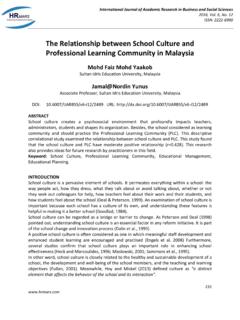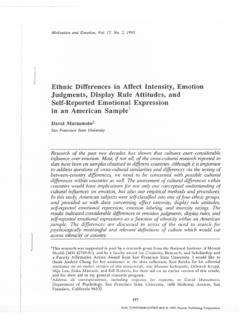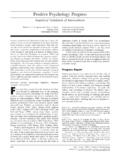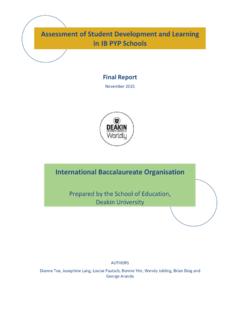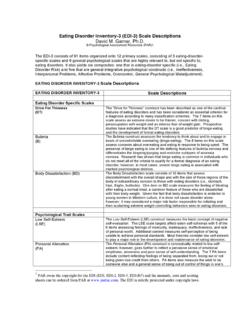Transcription of English-language Literature Review - OECD.org
1 Please cite this paper as: Derrick, J. and K. Ecclestone, (2008), English-language Literature Review , in Teaching, Learning and Assessment for Adults: Improving Foundation Skills, OECD Publishing. Teaching, Learning and Assessment for Adults Improving Foundation Skills English-language Literature Review Jay Derrick and Kathryn Ecclestone Centre for Educational Research and Innovation 8 07-Feb-2008 5:17:29 PM. Please cite this paper as: Derrick, J. and K. Ecclestone (2008), english - language Literature Review , in Teaching, Learning and Assessment for Adults: Improving Foundation Skills, OECD Publishing. TEACHING, LEARNING AND ASSESSMENT FOR ADULTS.
2 IMPROVING FOUNDATION SKILLS. English-language Literature Review Jay Derrick and Kathryn Ecclestone TEACHING, LEARNING AND ASSESSMENT FOR ADULTS: IMPROVING FOUNDATION SKILLS ISBN-978-92-64-03990-2 OECD/NRDC 2008. English-language Literature Review 3. Table of Contents 1. Introduction .. 5. 2. The Review s methodology and structure .. 6. 3. Defining formative assessment in adult learning .. 9. Competing meanings of learning .. 9. Formative activities .. 12. 4. Formative assessment and adult learning: discussion of themes emerging from the Literature .. 14. Developing an atmosphere and culture conducive to learning .. 15. Dialogue between teacher and learners.
3 20. Peer assessment and self-assessment .. 32. Learners understanding of assessment and the language of assessment .. 38. Feedback and marking of work .. 42. Questioning and checking learning .. 48. Planning and differentiation .. 51. Improving motivation and confidence, autonomy, and 53. Using different types of assessment 59. Practising assessment: learning for the future .. 65. 5. Conclusions and messages for teachers .. 68. Formative assessment and learners of adult literacy, numeracy and language .. 68. Messages for 69. Future research .. 76. References .. 76. Appendix 1: Texts reviewed .. 81. Appendix 2: Analysis of Review texts.
4 123. TEACHING, LEARNING AND ASSESSMENT FOR ADULTS: IMPROVING FOUNDATION SKILLS ISBN-978-92-64-03990-2 OECD/NRDC 2008. English-language Literature Review 5. 1. Introduction (Note: where references are made to the material surveyed in the Literature Review , they are printed in bold text. These references are given in appendix 1 of the Review . Other references, printed in ordinary text, are given in the references section.). This Review has been produced as a jointly-funded element of two research projects. The first is Improving Formative Assessment (IFA), a three year study of formative assessment practices in post-compulsory learning settings in the UK, which will be completed in December 2007.
5 This study has been funded by the Nuffield Foundation and the National Research and Development Centre for adult literacy and numeracy (NRDC). The second is the Organisation for Economic Co-operation and Development s (OECD) study Teaching, Learning and Assessment for Adults: Improving Foundation Skills. This is a study of national policy contexts and formative assessment practices in relation to adult literacy, numeracy and language learning in seven countries. The OECD study also commissioned Literature reviews in French, German, Spanish, and english : the last of these is the present paper. Much of the influential work in the UK on ideas about formative assessment and assessment for learning has been developed either in the compulsory sector in the context of a highly prescriptive summative testing system at five stages of children s schooling (Black and Wiliam, 1998.)
6 Black et al., 2005), or in relation to higher education (see for example Gibbs and Simpson, 2003, Brookhart, 2001, Crooks, 1988). While the theoretical and empirical work has generated a sound evidence base for identifying generic techniques and activities that teachers can use with students, there has not yet been an attempt to either a) relate these ideas to their potential use with adult learners in contexts for learning that are very different from schools and universities; or b) Review the Literature that might illuminate how formative assessment works with adults in the learning and skills sector and in informal learning situations.
7 It is especially important to establish a clear understanding based on sound theories and practices of formative assessment in the context of England and Wales, where the learning and skills sector (which includes adult education) has strong implicit theories of learning embedded in its systems for funding, quality assurance and performance measurement. The basic measurement tool for all these systems is the counting of qualification outcomes, which through benchmarking and comparison at all levels in the system, puts pressure directly onto teachers to adapt their teaching to the narrow requirements of the system rather than the needs of learners.
8 The use TEACHING, LEARNING AND ASSESSMENT FOR ADULTS: IMPROVING FOUNDATION SKILLS ISBN-978-92-64-03990-2 OECD/NRDC 2008. 6 English-language Literature Review . of summative outcomes for accountability thus directly affects ideas and practices in relation to formative assessment (see Derrick et al., in press;. Ecclestone et al., in progress). The gap in research on formative assessment for adult learning and growing evidence about the impact of strongly target-driven summative systems make it important to differentiate between activities that look like formative assessment but which may be little more than coaching or continuous summative assessment, and to examine the political, social and cultural factors that affect how teachers and students practise formative assessment in different learning and assessment contexts (Ecclestone, 2002, 2004, Torrance et al.)
9 , 2005, Ecclestone et al., in progress). We hope that this Literature Review will make a contribution to the illumination of these important issues, and ultimately make a positive material difference to the work of teachers and learners in adult education services. 2. The Review s methodology and structure The material surveyed directly in this Review was gathered and selected between June 2005 and February 2007, through a combination of means, including Internet searches on key words, suggestions from colleagues, bibliographical trails, and personal knowledge and experience. We started with a number of overview studies of adult learning, including Edwards et al.
10 (1998), Cullen et al. (2002), and in particular found Tusting and Barton (2003) and Zachry and Comings (2006) very useful. But finding relevant material has not been a systematic process, because attempts to search systematically for material on formative assessment and adult learning produced few results, except in relation to teaching and learning in higher education. These we decided to exclude in order to ensure this Review had its main focus clearly in the learning and skills sector, (that is, in adult learning in post-compulsory education not provided in universities and in workplaces), in informal adult learning, and in adult basic education; we hope however, that this Review will complement other research focusing directly on higher education.











